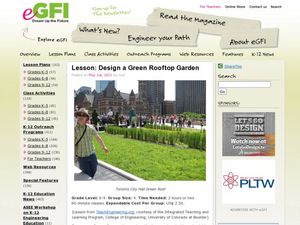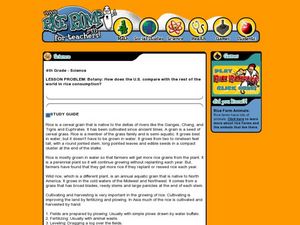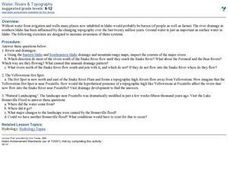Curated OER
The Southeast Anatolia Project
This resource is amazing. It is a full project including teacher notes, handouts, procedure, and worksheets. It introduces learners to the GAP project, a social environmental group working to bring irrigation, assistance, and increased...
eGFI
Design a Green Rooftop Garden
Design and construct buildings with rooftop gardens. Junior engineers work in groups to build two buildings and then perform experiments to determine whether or not a garden affects the building's temperatures. They graph and interpret...
Curated OER
Math: Real Time and Live
Get an interdisciplinary edge. Scholars study air contamination and slope. They record the time it takes for air fresheners to reach them at variable distances. They document their times, classify them by distance, and draw a scatter...
Curated OER
Geography of Mesopotamia
Students write a letter. In this irrigation lesson, students review how humans and the environment can interact with each other, learn new vocabulary words having to do with Mesopotamia, learn about irrigation and view maps of...
Curated OER
Urban Ecosystems 2: Why are There Cities? A Historical Perspective
Second in a series of five lessons, this lesson encourages preteens to consider cities as urban ecosystems. First, they keep a food diary for a few days. They visit the Natrional Agricultural Statistics Service website for current data...
Curated OER
Watering Our Prairie Farms
After reading an article about irrigation on Canadian farms, learners participate in a discussion. They individually write an opinion paper about the surrounding issues. A lesson like this can be used in an earth science class when...
Curated OER
Algebra 1
Students study the functional relationships of a variety of problems. In this functional relationship instructional activity, students determine the dependent and independent quantities of a given set of data. Students record...
Curated OER
Ag in My Community; Agriculture
Students build knowledge about agriculture as it relates to their communities' commodities. In this agriculture lesson, students brainstorm about conditions in their community with regards to growing different types...
Curated OER
Desert Dwellers
Students study deserts and how they occur. In this desert lesson students research deserts and desertification then divide into groups and come up with an action plan to help rehabilitate these areas.
Curated OER
History of Irrigation on the Great Plains
Students explore irrigation in the Great Plains throughout history. For this irrigation lesson, students listen to their instructor present a lecture on the history of irrigation in the world and on the Great Plains. Students conduct...
Curated OER
Quality of Rice
Sixth graders research how farmers irrigate, harvest, and keep high standards of rice. In this farming lesson, 6th graders discover how rice, wheat and soy beans are farmed. Students make a chart showing the similiarities and differences.
Curated OER
Rice Consumption
Fourth graders discover facts about rice and how it is farmed. For this rice research lesson, 4th graders investigate how much rice is eaten in the United States compared to other countries. Students research countries and graph the...
Curated OER
Usefulness of Irrigation
Students explore irrigation. In this science lesson plan, students show that water is necessary for plant growth and show how a dam can turn a nearly useless water way into a valuable form of irrigation.
Curated OER
Wheat: Ancient and Ageless
Sixth graders investigate the role of wheat in society. In this Social Studies lesson, 6th graders explore wheat production from ancient civilizations to modern times. Students describe wheat's importance in shaping culture.
Curated OER
Utah's Own
Fourth graders examine the effects of humans on the environment. For this Social Studies lesson, 4th graders analyze human changes to the environment. Students explore the actions and effects at a community level.
Curated OER
Botany: Irrigating of Rice
Fourth graders discover agriculture by researching the irrigation of rice. In this farming lesson, 4th graders read about the different methods of rice farming and create an illustration for each different action. Students...
Curated OER
Water Exploration Station
Students explore the characteristics of water. In this water exploration lesson, students participate in various learning centers to inquire how water drains and how to increase the flow of water. Students use estimation and measurement...
Curated OER
Why Do We Build Dams?
Students are introduced to a dam and what a dam does. In this dam lesson plan, students explore how a dam uses water supply, electricity generation, flood control, recreation, and irrigation in order to control the water.
Curated OER
Water Cycle
In this water cycle activity, students answer questions about the water cycle using a word bank. Students label a diagram of the water cycle.
Curated OER
Water, Rivers & Topography
Young scholars explore the topography of Idaho and the importance of surface water and drainage. using digital maps, they inspect the courses of major rivers, Yellowstone Hot Spots, and the natural landscaping of Pocatello. Students...
Curated OER
The First Farmers
Students show how constant irrigation, with repeated evaporation of water that left salts in the soil, eventually ruined much farming land in southern Mesopotamia. They discuss the idea that with the development of irrigation people...
Curated OER
Water/Agua
Third graders complete water activities including vocabulary, visualization and performing activities. They study water vocabulary words in both English and Spanish. They listen to a read aloud of Jane Yolen's, Letting Swift River Go,...
Curated OER
Environment: Just Around the Bend
Pupils decipher landforms on a map and corresponding satellite imagery. They consider the impact of pollution on agriculture and water. They draw diagrams demonstrating how pollution works its way into the food source.
Curated OER
Wildlife Sampling
Seventh graders discuss water issues and its affect on salmon population. They recreate a sampling river with fish (cheddar) and scoop them to tag them (which means they exchange them for pretzel fish.) They complete a spreadsheet to...

























